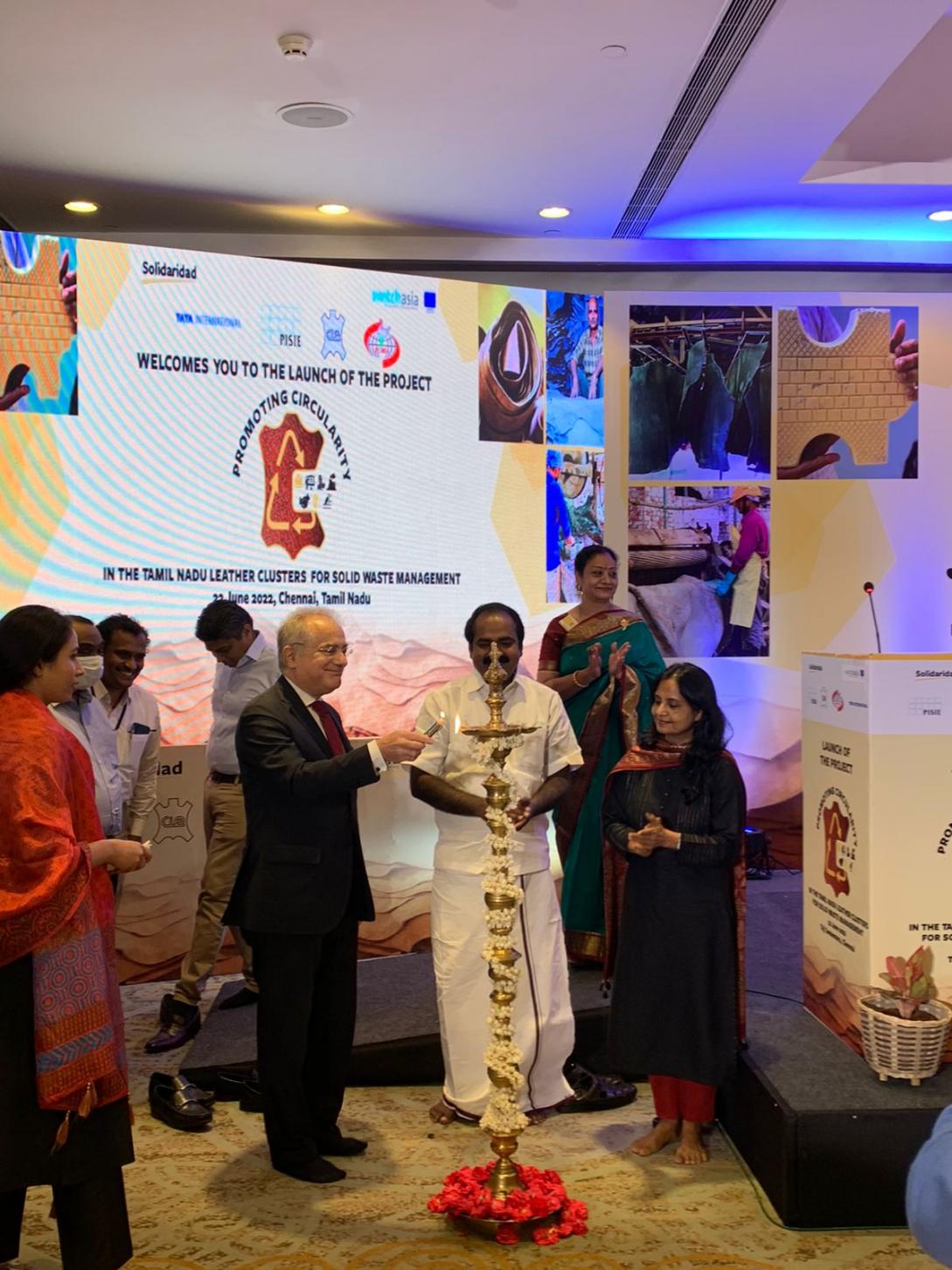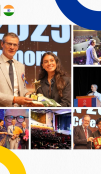Transitioning to sustainable Future for Tamil Nadu Leather Industry

Chennai, June 22, 2022: Solidaridad Regional Expertise Centre along with its partners— Politecnico Internazionale per lo Sviluppo Industriale ed Economico (PISIE), Indian Finished Leather Manufacturers and Exporters Association (IFLMEA), Council for Leather Exports, Tata International Limited and the European Union (EU) today launched an EU-India sustainability project for the leather clusters in Tamil Nadu. The project ‘Promoting circularity in the Tamil Nadu leather clusters for solid waste management’ is a 42-month initiative funded by the European Union under its SWITCH-Asia Programme, which promotes sustainable consumption and production across the Asia-Pacific region.
The project was launched by Hon’ble Minister of Environment, Climate Change and Forest, Government of Tamil Nadu Thiru Siva V.Meyyanathan and Ambassador of the European Union to India, H.E Ugo Astuto. The event also bought together a number of participants from India and EU including, Council for Leather Exports, key industry leaders and the representatives from development partner communities.
In line with Tamil Nadu’s effort to transition to a resource-efficient and circular economy model, this initiative supports clusters to adopt cleaner and sustainable production practices. This initiative entails pilot demonstration of sustainable technologies at the tanneries.
The EU is India’s third largest trading partner, with Europe being one of the largest markets for Indian leather products. The EU’s support to this initiative is in line with India’s development priorities. Speaking on the occasion, Ugo Astuto, Ambassador of the European Union to India, said, “We are very pleased to collaborate with Tamil Nadu on this project as sustainability, circular economy and resource efficiency are key pillars of the EU-India partnership. This project will not only help to reduce the environmental footprint of tanneries but also improve the health and safety conditions for workers, in line with the SDGs.”
With close to 600 tanneries located in Tamil Nadu, it is the key centre for the leather industry in India. The industry mainly processes semi-finished leather into finished and value-added products for export. The project, supported by the European Union, will follow four key approaches:
- Solidaridad will work with its partners and technical experts to demonstrate series of circular tanning and waste to value technologies at cluster level.
- Tannery workforce will be capacitated on better tanning practices, solid waste management and occupational health and safety through training-of-trainers Programme.
- Sectoral cooperation and market linkages for ‘waste to value’ products will be facilitated by engaging with potential national and international off-takers.
- A public-private partnership platform will be established that represents the interests of key stakeholders. These stakeholders will come together to create a roadmap for improving waste management at the cluster level.
About the EU and EU-India Ties
The EU, which consists of 27 countries, has the world's second largest economy and its third largest population, after China and India. Though richly diverse, the countries that make up the EU (its 'Member States') are all committed to the same basic values: peace, democracy, the rule of law and respect for human rights. By creating a frontier-free single market and a single currency (the euro) which has been adopted by 19 Member States, the EU has given a significant boost to trade and employment. It is also at the forefront of global policies on sustainability.
EU-India relations: For 60 years, the EU and India have worked together to reduce poverty, prevent disasters, expand trade, secure global public goods, enhance security around the world and promote joint research in energy, health, agriculture and many other fields of mutual interest. Guided by our common commitments towards Sustainable Development Goals (SDG), the EU is supporting India in its sustainable modernisation. Working with government agencies and civil society organisations, the EU also partners with India in support of its flagship programmes such as Swachh Bharat, the 100 Smart Cities Mission, the Atal Mission for Rejuvenation and Urban Transformation or Beti Bachao, Beti Padhao.
More information at: http://eeas.europa.eu/delegations/india; EU India Roadmap 2025: https://www.consilium.europa.eu/media/45026/eu-india-roadmap-2025.pdf
About the SWITCH Asia Programme:
The overall objective of the EU funded SWITCH-Asia programme is to promote sustainable and inclusive growth, contribute to the economic prosperity and poverty reduction in Asia and Central Asia and to a transition towards a low-carbon, resource-efficient and circular economy. Launched in 2007, the programme has achieved more than a decade of progress on SCP in 24 countries in the region. This has been possible through the joint efforts of the three SWITCH-Asia components:
• The Regional Policy Advocacy Component (RPAC) – implemented by UN Environment.
• The Sustainable Consumption and Production Facility – implemented by Deutsche Gesellschaft für Internationale Zusammenarbeit (GIZ), the Institute for Global Environmental Strategies (IGES) and adelphi.
• The SWITCH-Asia Grants Programme – directly managed by the Directorate-General for International Cooperation and Development of the European Commission.
Learn more at www.switch-asia.eu
About Solidaridad Regional Expertise Centre
Solidaridad Regional Expertise Centre (SREC) was established as a Charitable Trust in December 2008. The vision of SREC Trust is to support sustainable production in agriculture and industry, combined with sustainable trade and management of the environment around agricultural and industrial ecosystems that will make a significant contribution to combat poverty and preserving people's environment, in the context of a global economy SREC contributes to achieving its objectives by (a) Working with small farmers, government and businesses as a catalyst for improved food production, a safer workplace, access to clean water, and a better income. (b) Programmes are designed on criteria of sustainability so that finance, knowledge and skills remain available after the programme ends and continuity is ensured.
About Project Partners
Politecnico Internazionale per lo Sviluppo Industriale ed Economico (PISIE) is an Italian NGO that has wide experience in the field of training and technical assistance for SME’s within the tanning, textile and leather products sector.
Indian Finished Leather Manufacturers and Exporters Association (IFLMEA) is an umbrella organisation representing the MSME tanneries of Tamil Nadu Clusters
Council for Leather Exports (CLE) is an apex trade promotion organisation of Indian leather and leather products industry. CLE will assist with establishing market facilitation for waste to value products in the global and national markets.
Tata International Limited is a global trading and distribution company operating in several business segments, Trading, auto Distribution and Leather and Leather Products. The company manufactures and exports leather products, partners with global brands, and operates India’s only automotive leather tannery. Tata International will provide business and market inputs to integrate sustainability from a market perspective.





